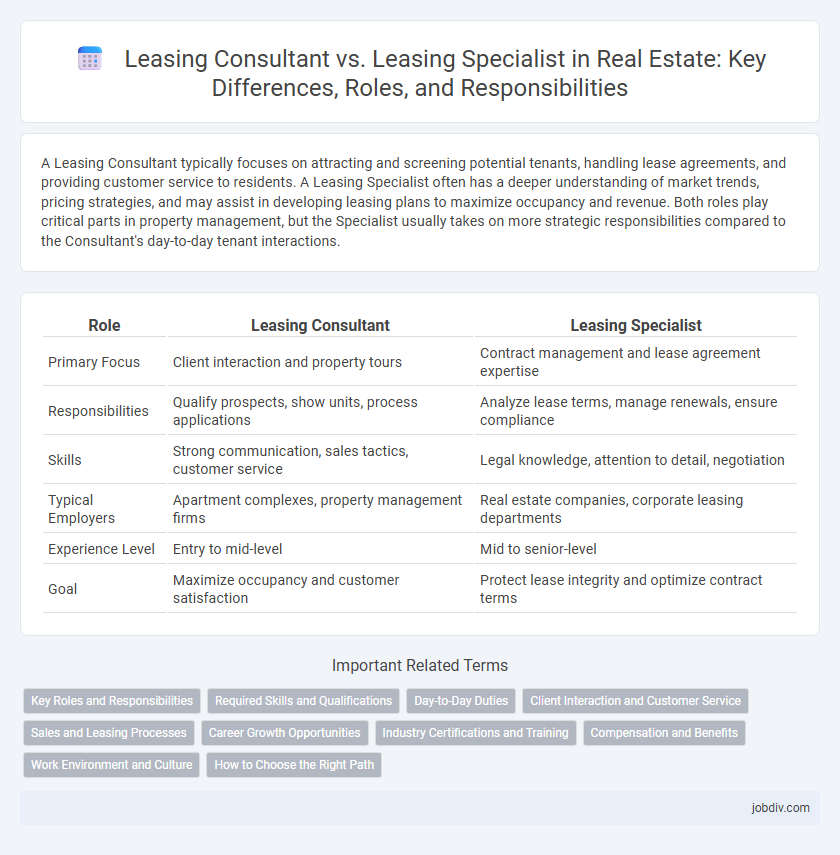A Leasing Consultant typically focuses on attracting and screening potential tenants, handling lease agreements, and providing customer service to residents. A Leasing Specialist often has a deeper understanding of market trends, pricing strategies, and may assist in developing leasing plans to maximize occupancy and revenue. Both roles play critical parts in property management, but the Specialist usually takes on more strategic responsibilities compared to the Consultant's day-to-day tenant interactions.
Table of Comparison
| Role | Leasing Consultant | Leasing Specialist |
|---|---|---|
| Primary Focus | Client interaction and property tours | Contract management and lease agreement expertise |
| Responsibilities | Qualify prospects, show units, process applications | Analyze lease terms, manage renewals, ensure compliance |
| Skills | Strong communication, sales tactics, customer service | Legal knowledge, attention to detail, negotiation |
| Typical Employers | Apartment complexes, property management firms | Real estate companies, corporate leasing departments |
| Experience Level | Entry to mid-level | Mid to senior-level |
| Goal | Maximize occupancy and customer satisfaction | Protect lease integrity and optimize contract terms |
Key Roles and Responsibilities
Leasing Consultants primarily focus on tenant relations, property showings, and processing rental applications to ensure high occupancy rates. Leasing Specialists handle more detailed lease documentation, compliance with housing regulations, and coordinate between management and tenants for smooth lease execution. Both roles require strong communication skills and knowledge of local real estate laws, but Leasing Specialists often have a deeper involvement in lease administration and regulatory adherence.
Required Skills and Qualifications
Leasing Consultants typically require strong interpersonal and communication skills, proficiency in property management software, and a basic understanding of real estate laws and local leasing regulations. Leasing Specialists need advanced knowledge of tenant screening processes, lease negotiation tactics, and detailed expertise in marketing rental properties to optimize occupancy rates. Both roles benefit from experience in customer service, sales techniques, and the ability to analyze market trends to support successful leasing strategies.
Day-to-Day Duties
Leasing Consultants primarily handle tenant inquiries, conduct property tours, and facilitate lease signings to attract and secure new tenants. Leasing Specialists focus on lease administration, processing applications, and ensuring compliance with leasing policies and regulations. Both roles collaborate to maintain occupancy rates and enhance tenant satisfaction through effective property management.
Client Interaction and Customer Service
Leasing Consultants excel in client interaction by providing personalized tours, addressing tenant concerns, and facilitating lease agreements, ensuring a seamless leasing experience. Leasing Specialists focus on customer service through in-depth knowledge of property features, lease terms, and community policies, offering tailored solutions that meet client needs. Both roles prioritize tenant satisfaction but differ in engagement depth, with Consultants often handling direct client communication and Specialists supporting with detailed information and problem-solving.
Sales and Leasing Processes
Leasing Consultants and Leasing Specialists both play crucial roles in real estate sales and leasing processes, yet their focus areas differ. Leasing Consultants primarily engage in direct client interactions, showcasing properties, conducting tours, and negotiating lease terms to drive occupancy rates. Leasing Specialists concentrate on behind-the-scenes tasks such as processing applications, verifying credentials, and ensuring compliance with leasing policies to streamline contract finalization and tenant onboarding.
Career Growth Opportunities
Leasing Consultants typically handle customer interactions and property showings, gaining foundational experience in tenant relations and sales, which sets the stage for career advancement. Leasing Specialists often possess deeper knowledge of lease agreements, property management software, and compliance regulations, positioning them for higher roles such as Property Manager or Leasing Manager. Both roles offer distinct pathways, with Leasing Specialists generally experiencing faster career growth due to their specialized expertise in legal and operational aspects of leasing.
Industry Certifications and Training
Leasing Consultants often hold industry certifications such as the National Apartment Leasing Professional (NALP) designation, which emphasizes foundational leasing skills and customer service excellence. Leasing Specialists typically pursue more advanced training, including certifications like the Certified Apartment Leasing Professional (CALP), focusing on specialized knowledge in property management and leasing law compliance. Both roles benefit from ongoing professional development through organizations like the National Multifamily Housing Council (NMHC) to stay current with leasing trends and regulatory changes.
Compensation and Benefits
Leasing Consultants typically earn a base salary combined with commission incentives based on the number of leases signed, often resulting in variable income potential. Leasing Specialists may receive a higher fixed salary with fewer performance-based bonuses but benefit from more comprehensive healthcare and retirement plans. Both roles usually include benefits such as paid time off, professional development opportunities, and housing discounts, though the exact compensation packages vary by company and location.
Work Environment and Culture
Leasing Consultants typically work in fast-paced, customer-focused environments such as residential or commercial property management offices, emphasizing direct interaction with potential tenants. Leasing Specialists often engage in more specialized roles within corporate real estate firms or larger property management companies, with a collaborative culture focused on market analysis and lease negotiation. Both roles require strong communication skills but differ in their focus on client-facing activities versus behind-the-scenes strategic tasks.
How to Choose the Right Path
Leasing consultants typically handle tenant relations and property tours, emphasizing customer service and sales skills, while leasing specialists often manage leasing documentation and compliance, requiring strong organizational abilities and knowledge of leasing laws. To choose the right path, assess your strengths: if you excel in interpersonal communication and sales, a leasing consultant role suits you; if you prefer administrative tasks and detailed legal processes, focus on becoming a leasing specialist. Research industry requirements, job descriptions, and career advancement opportunities to align your expertise with the specialized demands of each position.
Leasing Consultant vs Leasing Specialist Infographic

 jobdiv.com
jobdiv.com